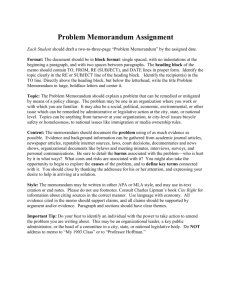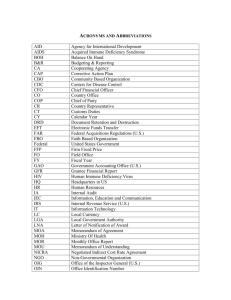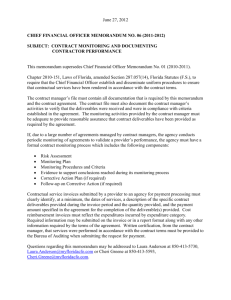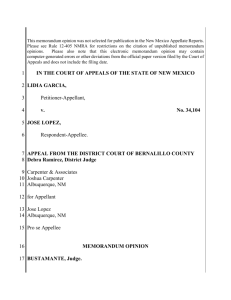C S ASE
advertisement
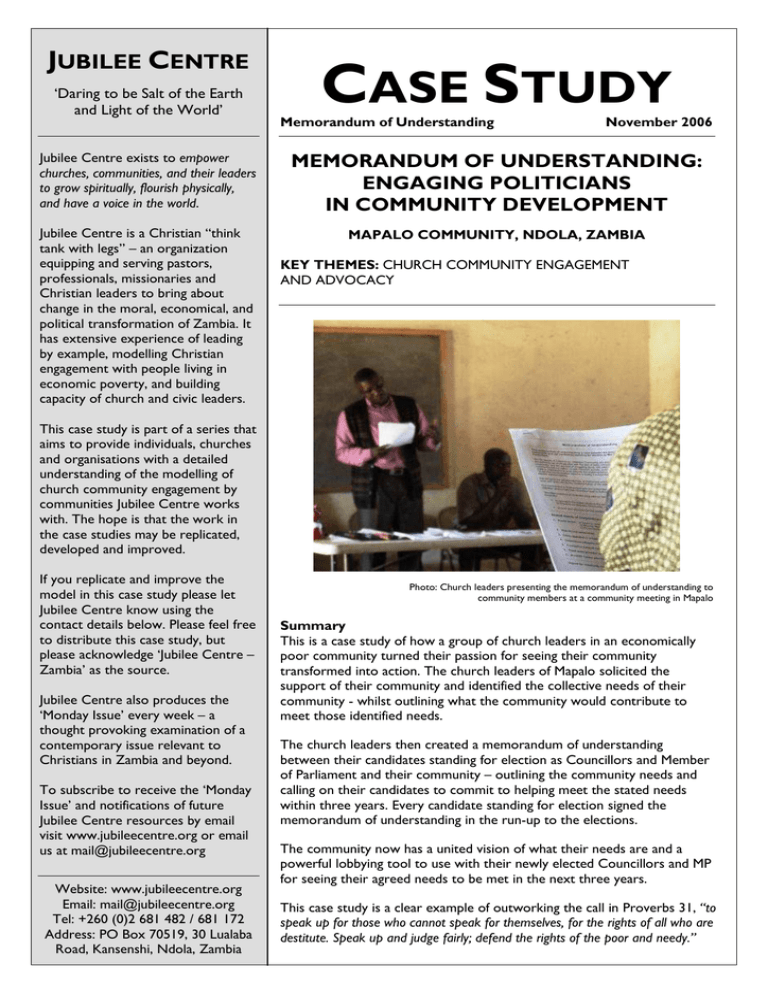
JUBILEE CENTRE ‘Daring to be Salt of the Earth and Light of the World’ CASE STUDY Memorandum of Understanding November 2006 Jubilee Centre exists to empower churches, communities, and their leaders to grow spiritually, flourish physically, and have a voice in the world. MEMORANDUM OF UNDERSTANDING: ENGAGING POLITICIANS IN COMMUNITY DEVELOPMENT Jubilee Centre is a Christian “think tank with legs” – an organization equipping and serving pastors, professionals, missionaries and Christian leaders to bring about change in the moral, economical, and political transformation of Zambia. It has extensive experience of leading by example, modelling Christian engagement with people living in economic poverty, and building capacity of church and civic leaders. MAPALO COMMUNITY, NDOLA, ZAMBIA KEY THEMES: CHURCH COMMUNITY ENGAGEMENT AND ADVOCACY This case study is part of a series that aims to provide individuals, churches and organisations with a detailed understanding of the modelling of church community engagement by communities Jubilee Centre works with. The hope is that the work in the case studies may be replicated, developed and improved. If you replicate and improve the model in this case study please let Jubilee Centre know using the contact details below. Please feel free to distribute this case study, but please acknowledge ‘Jubilee Centre – Zambia’ as the source. Jubilee Centre also produces the ‘Monday Issue’ every week – a thought provoking examination of a contemporary issue relevant to Christians in Zambia and beyond. To subscribe to receive the ‘Monday Issue’ and notifications of future Jubilee Centre resources by email visit www.jubileecentre.org or email us at mail@jubileecentre.org Website: www.jubileecentre.org Email: mail@jubileecentre.org Tel: +260 (0)2 681 482 / 681 172 Address: PO Box 70519, 30 Lualaba Road, Kansenshi, Ndola, Zambia Photo: Church leaders presenting the memorandum of understanding to community members at a community meeting in Mapalo Summary This is a case study of how a group of church leaders in an economically poor community turned their passion for seeing their community transformed into action. The church leaders of Mapalo solicited the support of their community and identified the collective needs of their community - whilst outlining what the community would contribute to meet those identified needs. The church leaders then created a memorandum of understanding between their candidates standing for election as Councillors and Member of Parliament and their community – outlining the community needs and calling on their candidates to commit to helping meet the stated needs within three years. Every candidate standing for election signed the memorandum of understanding in the run-up to the elections. The community now has a united vision of what their needs are and a powerful lobbying tool to use with their newly elected Councillors and MP for seeing their agreed needs to be met in the next three years. This case study is a clear example of outworking the call in Proverbs 31, “to speak up for those who cannot speak for themselves, for the rights of all who are destitute. Speak up and judge fairly; defend the rights of the poor and needy.” 2 Background: from being ‘crushed’ to a ‘blessing’ Mapalo is a community known for its economic poverty. As an urban densely populated community on the outskirts of Ndola, the second-largest city in Zambia, Mapalo is home to over 40,000 people. Over 20% of the people of Mapalo are infected with HIV/AIDS (Zambia Bureau of Statistics, 2003) with no access to anti-retroviral drugs. One clinic with an out-sourcing Voluntary Counselling & Testing (VCT) centre serves the entire community, with no available doctor on-site. Unpaved roads reduce the local traffic flow, preventing the export of market goods to nearby townships and raising the price of imported goods. The land has not yet been zoned by the government (e.g. official land titles given to those on the land), so haphazardly-built residential shelters are home to families living as refugees in their own country. Jubilee Centre was started in 2000 and since that time it has been working with church leaders in Mapalo – seeking to equip their churches to be vehicles of transformation within their own community. In 2003 Jubilee Centre helped bring together the community leaders of Mapalo – including the leaders of the markets, youth, churches, women’s groups, resident development committee and political parties – to discuss the ‘Mapalo that we the community want.’ Thirty leaders met together at Chinaka House in Ndola and resolved to change the name of their community from Chipulukusu (meaning ‘crushed’) to Mapalo (meaning ‘blessing’) – they themselves also identified the major problems facing their community. The community leaders decided that they no-longer wanted others coming into their community to bring ‘development’ – but rather, whilst they still welcomed the help of others from outside, they themselves wanted to identify their needs and be the ones spearheading the development of their own community. Since that time Jubilee Centre has been supporting the church leaders to bring about that transformation. Pastors Fellowship Meetings The Mapalo Pastors’ Fellowship, with representatives of twenty churches in the community, has met weekly for prayer and fellowship since 1999. Jubilee Centre has led the pastors beyond fellowship to action in a bold direction, provoking the pastors to think critically about the community’s condition. For the community to move forward, it was apparent that it would take not only the work of the local churches, but also the assistance and support of the community’s political representative was also essential. Political representation Up until this time Mapalo’s experience of political representation had been poor – the community had never seen their Member of Parliament step foot into Mapalo during his previous five years of office. During the Spring of 2006, advocating for the support of politicians became the primary objective of the Mapalo Pastors Fellowship. It was a critical time in Zambia with national elections expected in September of 2006. The pastors met weekly, aided by Jubilee Centre, to draft a memorandum of understanding, or social contract. The purpose of this contract was to advocate for the assistance of local politicians in meeting the needs of the community in Mapalo. Using the run-up to the elections as a tool for engaging the support of their candidates would enable the community to solicit the support of their new MP and Councillors for the coming years. The memorandum of understanding The pastors started by identifying the needs of their community including the paving of roads, establishment of a high school, upgrading of the community clinic to a hospital, and bringing piped water. The opening lines of the memorandum capture the passion and vision for the community: Photo: Pastor Peter rallying support for a community meeting where residents agreed to the stated community needs in the memorandum of understanding “We the people of Mapalo Community are anguished with the poverty and pain we are suffering, we are frustrated with the lack of basic services and infrastructure in our community, and we are tired of struggling 3 alone… We call upon our elected Member of Parliament and Councillor to make a commitment to both act upon and advocate for the implementation of the stated needs in our community…” (See Appendix A for complete version of the Memorandum of Understanding) After the memorandum of understating had been drafted with a list of seven needs, the pastors organised a community leaders’ meeting to involve civic and business leaders in formulating a full plan of action for the community. The memorandum of understanding was updated to include the concerns outlined by these leaders and detail was added to the seven areas of need. Community contribution The memorandum also included a commitment from the community to meeting the stated needs: “We the residents of Mapalo Community are both willing and eager to contribute towards the development of our own community. While we call upon our elected officials to lead in this fight, we make ourselves available to contribute in every way possible. In the past we have shown resolve to develop our own community. For example, Misundu Market Road was primarily built with our own labour and resources. Other examples of our own efforts include the construction of Market B, the community clinic, community schools, and police post; the connection of water from Misundu to Mapalo; and the formation of home-based care organisations. In short, our community is committed to its own growth and development. To move forward towards this development we agree to contribute 25% of the labour and resources necessary for the stated community needs. In addition, our community buildings are available for community meetings and other gatherings. We are willing to cooperate with government officials, gazetteers, construction companies, faithbased organisations, non-governmental organisations, and any other willing stakeholders to work towards the development of our community.” Mobilising support A community meeting was then held to present the memorandum of understanding to the community at large. Residents of Mapalo were invited to the meeting and the needs in the memorandum were presented by different church and community leaders. Copies of the memorandum were then printed with signatory petition pages – and given to the community leaders to solicit support from the whole community. Pastors informed their congregations during their Sunday services, market leaders informed the market stall holders, and people talked to their neighbours. In total, 3,500 residents of Mapalo signed the memorandum of understanding – agreeing that these were their needs – and so the stage was set for community engagement with the electoral candidates. Getting candidates support Two leaders represented the community of Mapalo at an open press conference with all the candidates standing for election as MP for Ndola Central constituency in the run-up to the elections. The Mapalo leaders challenged the electoral candidates to sign the memorandum of understanding, and invited them to a community meeting to publicly show their support. The community leaders followed this up by sending a copy of the memorandum and invitation letters for the community meeting to each candidate. Photo: ‘Voting for a better tomorrow’ – Electoral Commission of Zambia representative attends community meeting On 9 September 2006 the electoral candidates, pastors, civic leaders, and over one-thousand community members congregated for the community meeting. All the candidates standing as councillors and three of the parliament candidates attended the meeting. Portions of the memorandum of understanding were read aloud, and representative community members vocalized the urgency and magnitude of the community needs. At the close of the meeting, the candidates were given the opportunity to sign the memorandum of understanding as a visible demonstration of their solidarity with the community, agreeing to implement most of the stated needs 4 within the first three years of their term if elected. All the candidates promptly signed – photos were taken of the candidates as they signed – and copies were sent to the district court for public documentation. News of the meeting spread quickly to the media, heard on radios across the country. Those representatives unable or unwilling to attend the meeting quickly made arrangements and communicated their intentions to publicly sign the memorandum – the political power of the community meeting could not be ignored by any candidate! Unexpected repercussions In the weeks following the community meeting before the national election, the effects of an empowered electorate in Mapalo Community could be felt in the locally and nationally: An ambitious community youth initiative in Mapalo that had sought government funding for the previous three years received expedited government approval within two weeks of the meeting The community needs stated in the memorandum, which were focused on development issues, started appearing in candidates literature – with some candidates going so far as to congratulate the community of Mapalo for identifying needs consistent with their own political agendas for office Some of the key church leaders in mobilizing the efforts of Mapalo Community were personally harassed. After turning down proposals for political affiliation, they received telephone calls from unidentified parties threatening them to ‘watch their back.’ They were also interviewed and cross-examined by the police several times to ensure of their political neutrality. In the end, their pure motive for the development of their community withstood all examination and intimidation A community in a neighbouring constituency also started creating their own memorandum of understanding to use for their own community development advocacy after the elections The Electoral Commission of Zambia, responsible for pre-election education, showed the memorandum of understanding from Mapalo to over thirty community meetings in the run-up to the elections. Photo: Candidates signing the memorandum of understanding in front of over one thousand residents of Mapalo in the run-up to the elections After the elections With the signed support of the newly elected Councillors and MP, the community of Mapalo has a powerful lobbying tool to call for the agreed needs to be met in the next three years. The advocacy work of the leaders of Mapalo has not finished – they are now holding their elected representatives accountable to demonstrate their support of the memorandum with action. The leaders’ first move after the elections was to write a formal letter addressed to the newly elected representatives, and copied to interested parties in government ministries and opposition parties, congratulating the MP on their election win and reminding them of their commitment to meeting the needs of Mapalo during their term of political office (see Appendix B for full copy of letter ). The community of Mapalo now eagerly awaits the next episode in seeing their community transformed – with the needs they identified in the memorandum being met through their own actions and those of their elected representatives, local council and national government. JUBILEE CENTRE ‘Daring to be Salt of the Earth and Light of the World’ Website: www.jubileecentre.org Email: mail@jubileecentre.org Tel: +260 (0)2 681 482 / 681 172 Address: PO Box 70519, 30 Lualaba Road, Kansenshi, Ndola, Zambia 5 APPENDIX A - Complete version of the Memorandum of Understanding - Memorandum of Understanding This memorandum of understanding is held between the people of Chipulukusu (Mapalo) Community and our candidates standing for election as Member of Parliament and Councillors. We the people of Chipulukusu (Mapalo) Community are anguished with the poverty and pain we are suffering, we are frustrated with the lack of basic services and infrastructure in our community, and we are tired of struggling alone. We want to be part of the transformation of our community and our nation, to see it flourish socially, economically and spiritually. Therefore, we make a commitment to work towards the implementation of the stated needs in our community. To see this transformation become a reality it is essential we have the support and action of our elected representatives. We call upon our elected Member of Parliament and Councillor to make a commitment to both act upon and advocate for the implementation of the stated needs in our community. Our commitment is in alignment with the United Nations Millennium Development Goals that the Zambian government has committed itself to fulfil in partnership with world leaders. This Memorandum of Understanding calls on the newly elected Member of Parliament and Councillor to represent the stated needs to the government and local council on behalf of the people of Chipulukusu (Mapalo) Community, and to work and advocate for the needs to be implemented within three years Stated needs of Chipulukusu (Mapalo) Community 1. Roads tarred: a) Zesco to railway line road b) Misundu Market road c) Re-surfacing of the Network-Push road 2. High School established 3. Clinic upgraded to hospital status 4. Chipulukusu (Mapalo) Community gazetted 5. Foundations slabbed and roofs constructed at Chibolele Market and Chipuluksu Market A 6. Piped water provided and drainage system improved 7. VCT/ART Centre with CD4 Count Machine established CHIPULUKUSU (MAPALO) COMMUNITY CONTRIBUTION We the residents of Chipulukusu (Mapalo) Community are both willing and eager to contribute towards the development of our own community. While we call upon our elected officials to lead in this fight, we make ourselves available to contribute in every way possible. In the past we have shown resolve to develop our own community. For example, Misundu Market Road was primarily built with our own labour and resources. Other examples of our own efforts include the construction of Market B, the community clinic, community schools, and 6 police post; the connection of water from Misundu to Mapalo; and the formation of home-based care organisations. In short, our community is committed to its own growth and development. To move forward towards this development we agree to contribute 25% of the labour and resources necessary for the stated community needs. In addition, our community buildings are available for community meetings and other gatherings. We are willing to cooperate with government officials, gazetteers, construction companies, faith-based organisations, non-governmental organisations, and any other willing stakeholders to work towards the development of our community. STATED NEEDS We of Chipulukusu (Mapalo) Community do not wish to be subjugated to the agenda of any politician; we are capable of identifying our own developmental needs, including the following: 1. Roads tarred Roads are the backbone of the development of any community. With good roads our local economic, social, health, and educational services are improved. Specifically, the Zesco to Misundu and the Misundu to Market B roads need to be tarred. These roads are crucial to the development of our local economy. In addition, the internal circuit roads of our community must be resurfaced to improve the accessibility of our entire community. In short, good roads provide opportunities for the people of Chipulukusu (Mapalo) Community to participate in national development. Without the roads resurfaced, our community of Chipulukusu (Mapalo) lacks… Business customers, especially those from Northrise and Kansenshi Convenient transport of goods to other nearby communities Crucial emergency accessibility With the roads resurfaced, our community of Chipulukusu (Mapalo) will gain… Transport of goods from Mapalo to surrounding communities, especially Northrise, Kansenshi, and outlying towns Increased variety in goods from surrounding communities Increased outside capital investment Easier emergency transport Better access to secondary schools Improved abattoir and transport for meat industry 2. High school established Our own Chipulukusu (Mapalo) Community is among the most highly populated shanty-compounds in Ndola, with a high distribution of youth. We have six community primary schools without any high school. As a result, our children must walk long distances to schools in other places, making them vulnerable to abuse and reducing their ability to concentrate in school. Travel costs are too much of a burden for many families, preventing children from going to secondary school. The results of low high school graduation rates in our community include high unemployment, increased prostitution, early marriages, drug and alcohol abuse, and crime. With a high school in our community, increased education rates will contribute towards the betterment of the entire community. Without a high school in our community of Chipulukusu (Mapalo)… Children must walk long distances to school Risk of child abuse by taxi drivers is increased Students lack concentration due to prolonged travel time Parents cannot afford to send their children to school due to transport costs The high school-age population in Mapalo is largely inactive Early marriage is common, due to lack of alternative opportunities With a high school in our community of Chipulukusu (Mapalo)… Jobs are created for teachers and other school staff Children are more motivated to go further in their studies through competition with their peers Accessibility to school is greatly increased, resulting in higher graduation rates and literacy rates Long-term job employment is improved 7 Prostitution and child abuse are prevented Crime rates, drug abuse, and HIV/AIDS infection rates decrease, due to positive activity opportunities Citizens of Mapalo are better informed because of increased education Leaders are developed within Mapalo 3. Clinic upgraded to hospital status Our community has 60,000 residents with no hospital. Our current clinic cannot meet the medical needs of our community, forcing residents to travel to the congested Ndola Central Hospital. The clinic lacks a VCT Centre, CD4 Count Machine, and ARVs, resulting in limited HIV/AIDS assistance. In addition, the medical technology and expertise of our clinic are insufficient according to the medical demands of our community. The number of clinic staff is inadequate to provide critical prevention education, such as prenatal education. When provided with a hospital, the general health of our community will dramatically improve through the medical services and preventative education provided. Without a hospital in our community of Chipulukusu (Mapalo)… There is no doctor on-site for an area with 60,000 people X-ray machines, CD4 Count Machine, laboratory equipment, and other medical technology are not available No VCT Centre or access to ARV’s are available Surgeries and complex birth procedures are unavailable to residents There is no mortuary facility Referral to the nearest hospital results in vulnerable emergency transport situations With a hospital in our community of Chipulukusu (Mapalo)… Residents are serviced with medical expertise within their community Qualified doctors and staff are available Regular, consistent malarial, tuberculosis, and ARV treatment are available Medical technology and equipment are provided Stigma for those going for VCT or receiving ARVs is reduced Excessive transport for vulnerable patients is reduced Mortuary transport costs are reduced 4. Chipulukusu (Mapalo) Community gazetted We are currently living as refugees in our own community because our community has yet to be gazetted. As a result, unfair electricity charges and the lack of land ownership and title deeds limit the economic capacity of our community. We are recognised as a community only during elections when our votes are in demand; yet we lack the proper recognition we deserve as citizens of Zambia, possible through gazetting our community. When our community is gazetted, we stabilize the infrastructure of our community, increasing its prospects for the future. We are empowered to access financial loans, increasing outside investment opportunities. Without our community of Chipulukusu (Mapalo) gazetted… We are living as refugees within our own country Electricity rates are exceedingly high Basic services are scarce and unpredictable Residents lack title deeds to their own land No long-term community organisation plan exists Outside investment is inhibited With our community of Chipulukusu (Mapalo) gazetted… Electricity costs are reduced and equalized Business investments are more secure and stable Participation in the global market is available Residents have title deeds, enabling them to access income-generating loans and investments Voting and residency legislation are harmonized 5. Foundations slabbed and roofs constructed at Chibolele Market and Market A 8 Our market is the source of our livelihood; our food, goods, and other basic necessities come from our market. However, while our community contribution towards and participation in the market is strong, the market lacks basic infrastructure. As a result, outside investment is limited and our market is vulnerable to disease outbreaks and harsh weather conditions. With the foundations slabbed and the roofs constructed at Chibolele Market and Market A, our local economy is greatly enhanced. Without the foundations slabbed and a roofs constructed at Chibolele Market and Chipulukusu Market A… Outside investment is limited Variety of goods and services are limited Our market is vulnerable to weather conditions and the poor drainage system Our community is vulnerable to the outbreak of diseases Produce lifespan is short With the foundations slabbed and a roofs constructed at Chibolele Market and Chipulukusu Market A… Foreign investment is increased due to stability of the market Susceptibility of the community to disease outbreaks is reduced Year-round trading is available Our customer base is expanded Job creation is increased General standard of living is improved and community morale increased Produce lifespan is improved 6. Piped water provided and drainage system improved Water is the lifeblood of our community, critical to our survival. Without piped water, we are forced to either use poor shallow wells or travel long distances to purchase water. In addition, poor drainage systems are the largest contributor to outbreaks of water-borne diseases. With piped water to our community, our access is greatly improved. Moreover, with improved drainage systems the risk of disease is drastically reduced and the community standard of health is improved. Without piped water provided and an improved drainage system in our community of Chipulukusu (Mapalo)… The community is susceptible to outbreaks of water-born diseases Roads and housing infrastructure are vulnerable to running water and excess sewage Shallow wells cause dysentery, diarrhoea, cholera, and other diseases long-distances and kiosk charges are incurred Stagnant water becomes breeding ground for mosquitoes, resulting in high rates of malaria With piped water and improved drainage systems in our community of Chipulukusu (Mapalo)… Access to clean, safe drinking water is improved Longevity for roads and housing infrastructure is improved Water-borne diseases are prevented, including malaria, cholera, dysentery, and diarrhoea Charges for water are reduced and de-politicised General community health standards are improved 7. VCT/ART Centre with CD4 Count Machine established HIV/AIDS is an epidemic affecting the entire nation of Zambia, including the community of Mapalo. Without a VCT Centre, access ARVs, or a CD4 Count Machine, our community is in danger, susceptible to an increase in infection rates because of insufficient resources. With a VCT/ART Centre and a CD4 Count Machine, our community is equipped to better coordinate our local efforts in the fight against HIV/AIDS. Without the establishment of a VCT/ART Centre with a CD4 Count Machine in our community of Chipulukusu (Mapalo) … There are higher rates of ignorance about one’s status, leading to increased infection rates No central, stable location is available for our fight against HIV/AIDS Transport costs incurred from travel to the hospital are incurred 9 With the establishment of a VCT/ART Centre with a CD4 Count Machine in our community of Chipulukusu (Mapalo) … HIV/AIDS infection rates are reduced through knowledge of one’s status There is increased nutritional support for people living with HIV/AIDS A VCT Centre is established and utilized by our community, so that people know their status There is local access to ARVs and nutritional support Stigmatization from travel for ARV treatment is eliminated Regular blood count tests are available for people living with HIV/AIDS, creating longer life expectancies Conclusion We the people of Chipulusuku (Mapalo) Community are determined to work towards the development of our community. We have demonstrated our commitment in the past, and we now call upon our elected leaders to participate towards the betterment of our community. This requires that our leaders set aside their personal agendas for the stated needs of our community. We do not want empty promises or fancy slogans; we demand action. We request our electoral candidates to sign in agreement and solidarity with our community needs. As a signatory of this document, each elected official commits himself/herself to implementing most of the stated needs within the next three years. Signed, The People of Chipulukusu (Mapalo) Community NAME SIGNATURE NATIONAL REG CARD NO. DATE 10 Section for candidates to sign – each candidate signed copies for themselves, for the Mapalo community and for public records at the district court: SOCIAL CONTRACT BETWEEN THE ELECTORATE OF CHIPULUKUSU (MAPALO) COMMUNITY AND THE WARD CANDIDATES FOR THE 2006 GENERAL ELECTIONS We the people, residents of Chipulukusu Community Ward in Ndola Central District of the Copperbelt Province hereby summarize the needs of our community as follows: 1. Roads tarred: a) Zesco to railway line road b) Misundu Market road c) Re-surfacing of the Network-Push road 2. High School established 3. Clinic upgraded to hospital status 4. Chipulukusu (Mapalo) Community gazetted 5. Foundations slabbed and roofs constructed at Chibolele Market and Chipuluksu Market A 6. Piped water provided and drainage system improved 7. VCT/ART Centre with CD4 Count Machine established After the 2006 general elections, our elected Ward Councillor and Member of Parliament hereby pledge to work with us to address the above problems affecting our community during his/her tenure in office, agreeing to make change in most of the stated areas within the first three years of his/her term, diligently consulting our community on the various issues of governance which affect us. This social contract has been entered into between the candidates and the electorate. Signed, ____________________/__________________________/__________/__________ (Name) (Signature) (Party) (Date) ____________________/__________________________/__________/__________ (Name) (Signature) (Party) (Date) ____________________/__________________________/__________/__________ (Name) (Signature) (Party) (Date) ____________________/__________________________/__________/__________ (Name) (Signature) (Party) (Date) ____________________/__________________________/__________/__________ (Name) (Signature) (Party) (Date) ____________________/__________________________/__________/__________ (Name) (Signature) (Party) (Date) 11 APPENDIX B - Full copy of the post-election letter Pastors Fellowship and Community Leaders of Mapalo (also known as Chipulukusu) PO Box 72515 Ndola Copperbelt Wednesday, November 01, 2006 Honorable Mushili Member of Parliament Ndola Central Constituency Dear Honorable Mushili, RE: Implementation of the Chipulukusu (Mapalo) Memorandum of Understanding As members of the Mapalo Pastors’ Fellowship, community leaders, and community residents, we would like to congratulate you for winning the elections and becoming our representative Member of Parliament in Ndola Central Constituency. Thank you for the bold action you took in signing the Mapalo Memorandum of Understanding. We now ask you to take action as our elected representative. It is our expectation that you will now begin to implement the changes we have articulated, as you have affirmed you would do through your public signing of our social contract. We want to partner with you in the development of our community and invite you to visit our community to discuss how we move forward together. We are requesting the Speaker to release you from normal duties – and inviting you to visit Mapalo (also known as Chipulukusu) on one of the following dates: 11, 18 or 25 November. We also would like to articulate the most urgent, necessary areas from the Mapalo Memorandum of Understanding you signed, in which we anticipate your action. First, we request that you follow up the issue of the tarring of the road from Zesco to the Misundu with the Ministry of Works and Supply and our local government. We ask that you attend the council meeting and ensure that this road issue is put on the council agenda. We do not know what has been happening to the constituency funds for our community for the last five years, but we had agreed that we wanted to use the funds to construct a new road from Misundu to Market B. We have contributed ourselves to start the project, and we know the government has released K6,500,000. However, we do not know what has happened to this money. Honorable sir, we hold you responsible for the disbursement of such funds during your term, and we ask that you follow up with this road issue with transparency, urgency, and persistence. Second, we want to see VCT and ART services at our clinic in Mapalo. The services currently provided at Ndola Central Hospital discriminate against the sick in our community. Please follow up this issue with the Ministry of Health. Also, we remind you that there is an immediate need to upgrade our clinic to hospital status complete with mortuary services. The economic burden of funerals is taxing on our community. Third, please ensure that our community is properly gazetted so that our residents receive proper titles to their land. We plead with you to take up this matter together with the local councilor at the next council meeting. For now, these are the three issues that we request you to pursue as our elected representative. As we mentioned, we do not expect you to do these things alone—we too are committed to doing everything within our means to ensure that these problems are addressed. However, there is no time to waste. As we write to you, the bridge on the road from Zesco to market is blocked, and water is running over the bridge. If this is not attended to immediately the bridge will be washed away and we will have no access to the city by road. 12 We look forward to receiving your confirmation of visiting our community on one of the dates specified above by telephone or post – and look forward to working with you to meet the needs of our community outlined in the Mapalo Memorandum of Understanding. On behalf of the Pastors Fellowship and community of Mapalo Yours sincerely Peter Chikoseleshe Churches Coordinator Pastor Mulenga, Chairman Mapalo Pastors’ Fellowship Mr James Mukuka Peace & Justice Community Coordinator CC: The President of the Republic of Zambia CC: Speaker of National Assembly, CC: The President of PF CC: Copperbelt Minister CC: The Copperbelt Permanent Secretary CC: District Commissioner CC: Ministry of Health CC: Ministry of Works and Supply CC: Town Clerk CC: Councilor for Chipulukusu Ward CC: Mapalo Residential Development Committee JUBILEE CENTRE ‘Daring to be Salt of the Earth and Light of the World’ Website: www.jubileecentre.org Email: mail@jubileecentre.org Tel: +260 (0)2 681 482 / 681 172 Address: PO Box 70519, 30 Lualaba Road, Kansenshi, Ndola, Zambia
